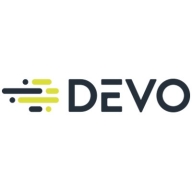

Securonix Next-Gen SIEM and Devo compete in the SIEM market, with Devo having the upper hand due to its feature set and user satisfaction despite higher costs.
Features: Securonix Next-Gen SIEM offers advanced analytics, threat detection capabilities, and strong customer support. Devo provides comprehensive data ingestion, processing features, and overall user satisfaction, making its extensive data handling capabilities particularly valuable.
Room for Improvement: Securonix Next-Gen SIEM needs better integration with third-party tools, improved performance during high traffic, and enhancements in its user interface. Devo could improve querying capabilities, visualization tools, and the consistency of its documentation.
Ease of Deployment and Customer Service: Securonix Next-Gen SIEM is noted for its smooth deployment process and excellent customer service. Devo's deployment is straightforward, though feedback on customer service responsiveness is mixed.
Pricing and ROI: Securonix Next-Gen SIEM offers competitive setup costs and good return on investment. Devo, despite being more expensive, is considered worth the premium due to its robust functionality and positive impact on ROI.
The solution is time-saving, particularly in the long run after it is deployed, enabling us to get value promptly.
They excel in response times and quick reactions when there's an actual threat.
If I raise a ticket, it initially goes to the L1 team, but the next level of escalation is really effective.
There is no UK-based support, which leads to delays in waiting for US support.
We have not had any customers come back to say they cannot scale at the speed of their business growth.
I can rate it around eight to nine, and it is very scalable and capable of handling tasks, especially for the on-premises product.
The solution is scalable as it is cloud-based and cloud-native.
The stability of Securonix Next-Gen SIEM is based on the events we are processing.
Integrations with other sandboxes could be improved to better interpret data using AI and machine learning models.
Developing custom connectors for each product, especially the internal applications, is difficult, and Securonix Next-Gen SIEM is not up to the mark.
When dealing with a large amount of data, such as when firewall logs increase, queries sometimes crash or get stuck.
The passing and setup are quite complex at the beginning, making onboarding not smooth.
Licensing is based on events per second (EPS), costing between $50 to $60 per EPS.
The solution is definitely not expensive.
The pricing has similar ingestion charges compared to other solutions, such as Splunk.
When they see a spike in a line chart for a failed login, which could be a true or false attempt, they can click that spike, and a table widget on the same active board instantly populates with raw logs of data for those specific failed logins.
The other SIEM solutions lack an option for big data analysis, whereas in the Securonix Next-Gen SIEM, we have this option.
The software includes user behavior interactions, dashboards, and training capabilities.
Now, the process is automatic, reducing our workload.
| Product | Market Share (%) |
|---|---|
| Securonix Next-Gen SIEM | 1.1% |
| Devo | 1.0% |
| Other | 97.9% |


| Company Size | Count |
|---|---|
| Small Business | 8 |
| Midsize Enterprise | 4 |
| Large Enterprise | 11 |
| Company Size | Count |
|---|---|
| Small Business | 10 |
| Midsize Enterprise | 5 |
| Large Enterprise | 19 |
Devo is the only cloud-native logging and security analytics platform that releases the full potential of all your data to empower bold, confident action when it matters most. Only the Devo platform delivers the powerful combination of real-time visibility, high-performance analytics, scalability, multitenancy, and low TCO crucial for monitoring and securing business operations as enterprises accelerate their shift to the cloud.
Securonix Next-Gen SIEM is a security information and event management solution designed to provide advanced threat detection, response, and compliance capabilities. It leverages machine learning and big data analytics to offer a comprehensive security platform for modern enterprises.
Securonix Next-Gen SIEM utilizes advanced analytics and machine learning to detect complex threats that traditional SIEM solutions might miss. Its architecture is built on Hadoop, enabling scalability and the processing of large volumes of data in real-time. This allows organizations to gain deep insights into security incidents, prioritize threats, and automate response actions. The solution also includes behavior analytics to detect insider threats and unknown attacks, integrating seamlessly with existing IT infrastructure.
What are the critical features of Securonix Next-Gen SIEM?
What is the ROI expectations?
Securonix Next-Gen SIEM is implemented across various industries, including finance, healthcare, and retail. Its flexibility and advanced analytics capabilities make it suitable for environments with complex security needs. In finance, it helps detect fraud, while in healthcare, it ensures patient data security. In retail, it protects against data breaches and payment fraud.
In summary, Securonix Next-Gen SIEM offers advanced threat detection, scalability, and integration capabilities, making it a robust solution for modern enterprises.
We monitor all Security Information and Event Management (SIEM) reviews to prevent fraudulent reviews and keep review quality high. We do not post reviews by company employees or direct competitors. We validate each review for authenticity via cross-reference with LinkedIn, and personal follow-up with the reviewer when necessary.